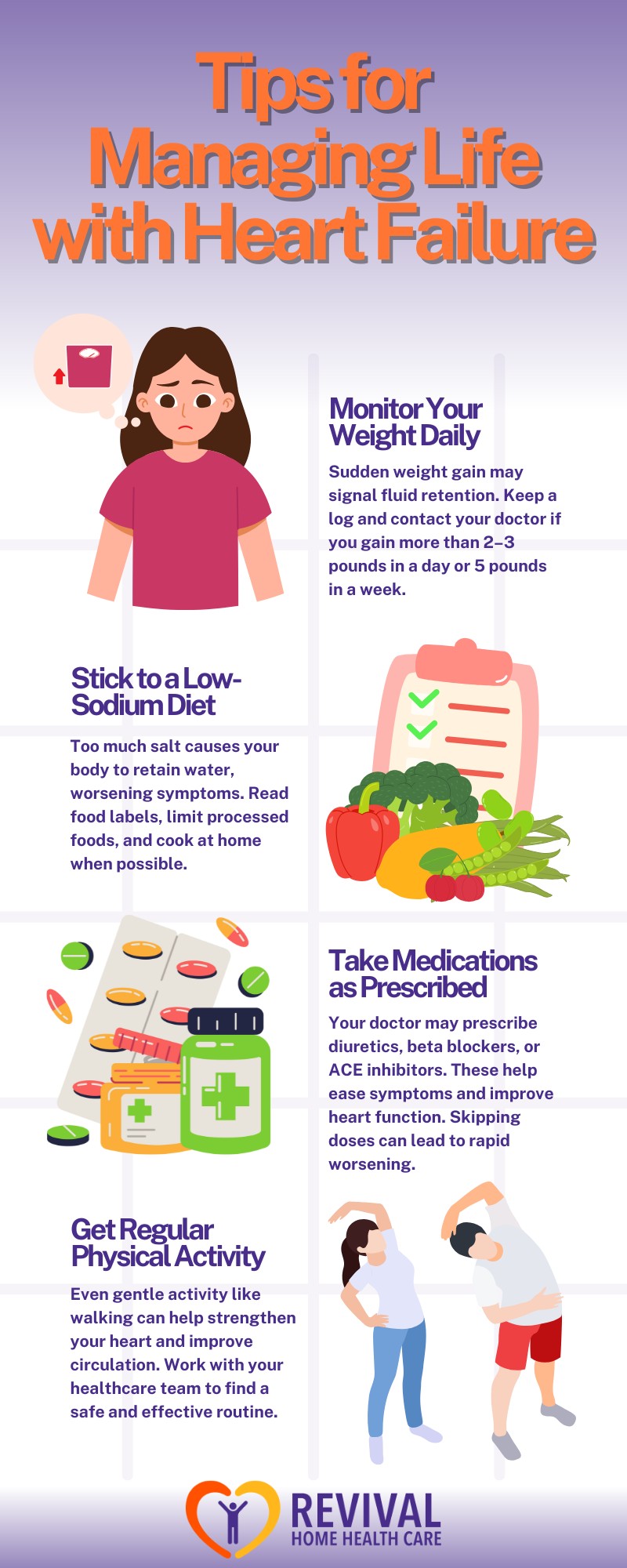Key Points:
- Heart failure symptoms often start subtly and may be mistaken for aging or other conditions.
- Early detection and timely medical attention are essential to prevent further heart damage.
- Some symptoms are more persistent or unusual, especially in women and older adults, and should not be dismissed.
It might start with shortness of breath while walking the dog, swelling in your feet after a long day, or waking up tired despite sleeping well. These seemingly minor issues may actually point to something far more serious: heart failure. Understanding the signs—and seeking timely care—can make all the difference in getting the help you need.

Understanding Heart Failure: What It Really Means
Heart failure doesn’t mean your heart has stopped working. Instead, it means the heart can’t pump blood as effectively as it should. This causes a ripple effect, impacting how oxygen and nutrients reach your body. It can result from conditions like coronary artery disease, high blood pressure, or previous heart attacks.
When the heart’s function is weakened, blood backs up, fluid builds up, and the body struggles to get what it needs to function well. Recognizing the signs early offers the best chance at managing the condition and maintaining quality of life.
Common Early Symptoms That Shouldn’t Be Ignored
Heart failure can sneak up on you. The symptoms may seem minor or easily explained away. But paying attention to these and seeking professional help can prompt an earlier diagnosis—and better outcomes.
1. Shortness of Breath
You may notice breathlessness during activities that didn’t used to tire you. Climbing stairs, walking short distances, or even lying flat in bed can become difficult. This happens because fluid builds up in the lungs, making it harder to breathe.
2. Persistent Fatigue and Weakness
Feeling constantly tired, even after a good night’s rest, is a common early symptom. When your heart doesn’t pump enough blood, your muscles receive less oxygen. Daily tasks like grocery shopping or even showering can leave you feeling exhausted.
3. Swelling in the Legs, Ankles, or Feet
Fluid retention is a hallmark sign of heart failure. Swelling—also known as edema—often shows up in the lower parts of the body. It might be worse at the end of the day or after long periods of sitting or standing.
Symptoms That Signal Progression
As heart failure progresses, the symptoms become more persistent and harder to ignore. Here are the red flags that require immediate medical attention.
1. Irregular Heartbeat
When the heart isn’t pumping efficiently, it often speeds up to make up for the reduced output. This can cause sensations like fluttering in the chest or noticeable palpitations. If this abnormal rhythm isn’t addressed, it may lead to serious health complications.
2. Chronic Cough or Wheezing
A wet cough that brings up white or pink mucus may indicate fluid in the lungs. Some people also report wheezing or a gurgling sound when breathing. If you’ve had a cough that lingers for weeks, it could be more than a seasonal bug.
3. Increased Need to Urinate at Night
Many people with heart failure find themselves waking up multiple times to urinate. This is due to fluid redistribution when lying down, which the kidneys then try to remove. It’s easy to miss as a symptom, but it often goes hand-in-hand with other signs.
Lesser-Known But Critical Signs
Heart failure doesn’t look the same for everyone. Some symptoms are more subtle or unusual, especially in older adults and women.
1. Difficulty Concentrating or Memory Issues
Reduced blood flow can affect the brain, leading to confusion, trouble focusing, or even memory lapses. These cognitive symptoms are sometimes misdiagnosed in older adults, so it’s important to consider heart failure as a potential cause.
2. Nausea or Lack of Appetite
When the digestive system receives less blood, it can lead to nausea, a feeling of fullness after eating a small amount, or a general loss of appetite. It may seem like a stomach issue, but it could stem from heart trouble.
3. Depression or Mood Changes
Living with an undiagnosed chronic illness can trigger emotional changes. People with heart failure may feel unusually anxious or depressed before they even know they’re sick. This emotional burden can worsen if left unaddressed.
What Causes Heart Failure in the First Place?
Understanding the root causes can help in both prevention and early detection. Heart failure often develops over time as the result of other underlying conditions.
1. High Blood Pressure
Over time, high blood pressure forces the heart to work harder than normal. This weakens the heart muscle and increases the risk of failure.
2. Coronary Artery Disease
When arteries become narrowed or blocked, the heart doesn’t get the oxygen it needs. This can lead to heart attacks, which damage heart tissue and reduce its ability to pump efficiently.
3. Diabetes
Elevated blood sugar levels damage blood vessels and contribute to conditions that increase the heart’s workload. Managing diabetes is essential in reducing heart failure risk.
When to See a Doctor
Many people delay seeking help because they attribute symptoms to aging, weight gain, or a sedentary lifestyle. But the sooner you act, the better your chances of managing heart failure effectively.
- If you experience shortness of breath that limits daily activities
- If your swelling is persistent and doesn’t go down overnight
- If fatigue interferes with your ability to perform simple tasks
Don’t wait until symptoms become severe. A simple exam, chest X-ray, or blood test can provide crucial insight into your heart health.
Tips for Managing Life with Heart Failure
While heart failure is a chronic condition, it can be managed with the right strategies and support systems in place.

Know the Difference: Heart Failure vs. Heart Attack
It’s important not to confuse heart failure with a heart attack. A heart attack is a sudden event where blood flow to the heart is blocked. Heart failure is a gradual loss of function over time. Both are serious, but they require different approaches in treatment and urgency.
Furthermore, dealing with heart failure isn’t just about managing symptoms—it’s about adapting your entire lifestyle. That can be overwhelming without the right help. That’s why support from professionals and home care services can make a huge difference, especially for older adults or those living alone.
Get Personalized Heart Care with Revival Home Health Care
If you or a loved one is dealing with heart failure, you don’t have to face it alone. Revival Home Health Care offers compassionate and professional heart failure home care in New York, designed to help individuals manage symptoms, stay out of the hospital, and maintain independence.
Our specialized care plans include monitoring, medication management, lifestyle coaching, and emotional support—all in the comfort of home. Whether you’re just starting your journey or dealing with advanced symptoms, we’re here to walk with you every step of the way.
Reach out to us today to learn how we can support your heart health at home.


 75 Vanderbilt Ave Staten Island, NY 10304
75 Vanderbilt Ave Staten Island, NY 10304 info@revivalhhc.org
info@revivalhhc.org 718.629.1000
718.629.1000